Today, crisis is the hour in the region, writes Vijay Prashad, with an eye on Port-au-Prince and Havana.

Préfète Duffaut, Haiti, “Le Générale Canson,” 1950.
By Vijay Prashad
Tricontinental: Institute for Social Research
 In 1963, the Trinidadian writer CLR James released a second edition of his classic 1938 study of the Haitian Revolution, The Black Jacobins: Toussaint L’Ouverture and the San Domingo Revolution.
In 1963, the Trinidadian writer CLR James released a second edition of his classic 1938 study of the Haitian Revolution, The Black Jacobins: Toussaint L’Ouverture and the San Domingo Revolution.
For the new edition, James wrote an appendix with the suggestive title “From Toussaint L’Ouverture to Fidel Castro.” In the opening page of the appendix, he located the twin revolutions of Haiti (1804) and Cuba (1959) in the context of the West Indian islands:
“The people who made them, the problems and the attempts to solve them, are peculiarly West Indian, the product of a peculiar origin and a peculiar history.”
Thrice James uses the word “peculiar,” which emerges from the Latin peculiaris for “private property” (pecu is the Latin word for “cattle,” the essence of ancient property).
Property is at the heart of the origin and history of the modern West Indies. By the end of the 17th century, the European conquistadors and colonialists had massacred the inhabitants of the West Indies. On St. Kitts in 1626, English and French colonialists massacred between 2,000 and 4,000 Caribs — including Chief Tegremond — in the Kalinago genocide, which Jean-Baptiste Du Tertre wrote about in 1654.
Having annihilated the island’s native people, the Europeans brought in African men and women who had been captured and enslaved. What unites the West Indian islands is not language and culture, but the wretchedness of slavery, rooted in an oppressive plantation economy. Both Haiti and Cuba are products of this “peculiarity,” the one being bold enough to break the shackles in 1804 and the other able to follow a century and a half later.
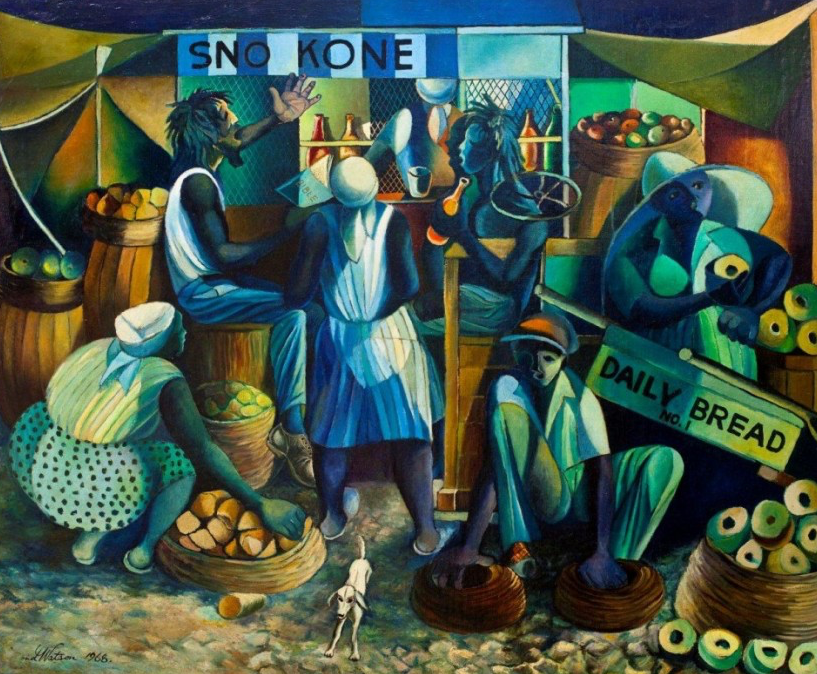
Osmond Watson, Jamaica, “City Life,” 1968.
Today, crisis is the hour in the Caribbean.
On July 7, just outside of Haiti’s capital of Port-au-Prince, gunmen broke into the home of President Jovenel Moïse, assassinated him in cold blood, and then fled. The country — already wracked by social upheaval sparked by the late president’s policies — has now plunged even deeper into crisis.
Already, Moïse had forcefully extended his presidential mandate beyond his term as the country struggled with the burdens of being dependent on international agencies, trapped by a century-long economic crisis and struck hard by the pandemic. Protests had become commonplace across Haiti as the prices of everything skyrocketed and as no effective government came to the aid of a population in despair.
Please Support Our Summer Fund Drive!
But Moïse was not killed because of this proximate crisis. More mysterious forces are at work: U.S.-based Haitian religious leaders, narco-traffickers and Colombian mercenaries. This is a saga that is best written as a fictional thriller.
Four days after Moïse’s assassination, Cuba experienced a set of protests from people expressing their frustration with shortages of goods and a recent spike of Covid-19 infections. Within hours of receiving the news that the protests had emerged, Cuba’s President Miguel Díaz-Canel went to the streets of San Antonio de los Baños, south of Havana, to march with the protestors.
Díaz-Canel and his government reminded the 11 million Cubans that the country has suffered greatly from the six-decade-long illegal U.S. blockade, that it is in the grip of former U.S. President Donald Trump’s 243 additional “coercive measures” and that it will fight off the twin problems of Covid-19 and a debt crisis with its characteristic resolve.
Nonetheless, a malicious social media campaign attempted to use these protests as a sign that the government of Díaz-Canel and the Cuban Revolution should be overthrown.
It was clarified a few days later that this campaign was run from Miami. And from Washington, D.C., the drums of regime change sounded loudly. But they have not found find much of an echo in Cuba. Cuba has its own revolutionary rhythms.
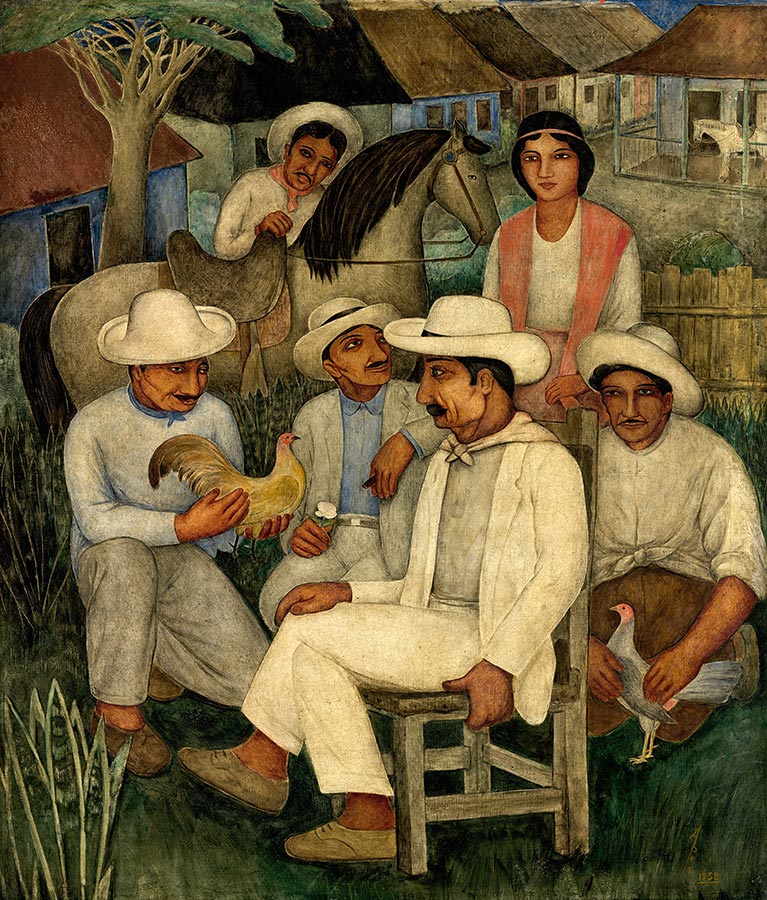
Eduardo Abela, Cuba, “Los Guajiros,” 1938.
In 1804, the Haitian Revolution — a rebellion of the plantation proletariat who struck against the agricultural factories that produced sugar and profit — sent up a flare of freedom across the colonized world. A century and a half later, the Cubans fired their own flare.
The response to each of these revolutions from the fossilized magnates of Paris and Washington was the same: suffocate the stirrings of freedom by indemnities and blockades.
In 1825, the French demanded through force that the Haitians pay 150 million francs for the loss of property (namely human beings). Alone in the Caribbean, the Haitians felt that they had no choice but to pay up, which they did to France (until 1893) and then to the United States (until 1947). The total bill over the 122 years amounts to $21 billion. When Haiti’s President Jean-Bertrand Aristide tried to recover those billions from France in 2003, he was removed from office by a coup d’état.
After the United States occupied Cuba in 1898, it ran the island like a gangster’s playground. Any attempt by the Cubans to exercise their sovereignty was squashed with terrible force, including invasions by U.S. forces in 1906-1909, 1912, 1917-1922 and 1933.
The United States backed General Fulgencio Batista (1940-1944 and 1952-1959) despite all the evidence of his brutality. After all, Batista protected U.S. interests and U.S. firms owned two-thirds of the country’s sugar industry and almost its entire service sector.
The Cuban Revolution of 1959 stands against this wretched history — a history of slavery and imperial domination.
How did the U.S. react? By imposing an economic blockade on the country from Oct. 19, 1960, that lasts to this day and has targeted everything from access to medical supplies, food and financing to barring Cuban imports and coercing third-party countries to do the same. It is a vindictive attack against a people who — like the Haitians — are trying to exercise their sovereignty.
Cuba’s Foreign Minister Bruno Rodríguez reported that between April 2019 and December 2020, the government lost $9.1 billion due to the blockade ($436 million per month). “At current prices,” he said, “the accumulated damages in six decades amount to over $147.8 billion, and against the price of gold, it amounts to over $1.3 trillion.”
None of this information would be available without the presence of media outlets such as Peoples Dispatch, which celebrates its three-year anniversary this week. We send our warmest greetings to the team and hope that you will bookmark their page to visit it several times a day for world news rooted in people’s struggles.
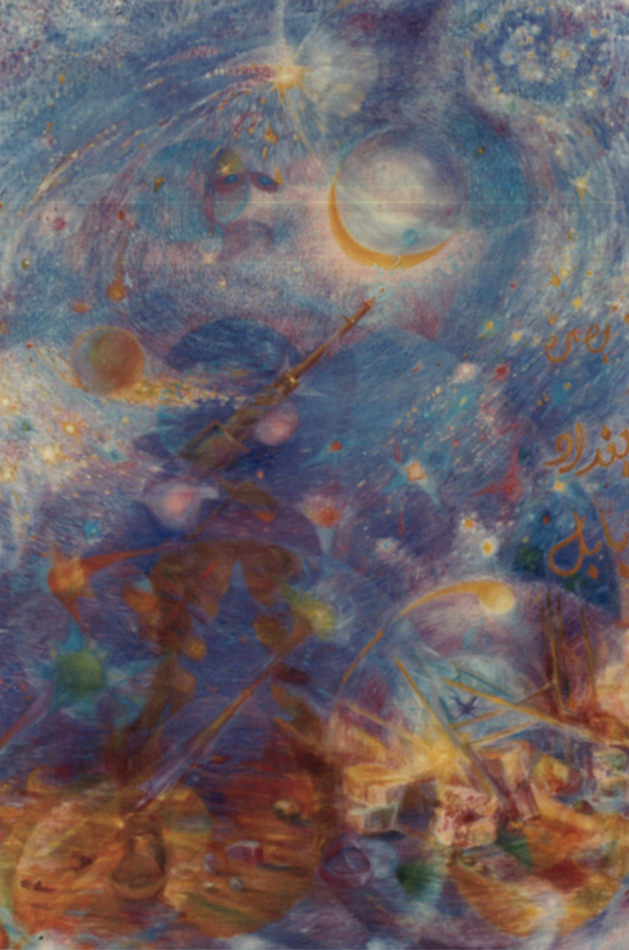
Bernadette Persaud, Guyana, “Gentlemen Under the Sky (Gulf War),” 1991.
On July 17, tens of thousands of Cubans took to the streets to defend their revolution and demand an end to the U.S. blockade. President Díaz-Canel said that the Cuba of “love, peace, unity, [and] solidarity” had asserted itself.
A few weeks before the most recent attack on Cuba and the assassination in Haiti, the United States armed forces conducted a major military exercise in Guyana called Tradewinds 2021 and another exercise in Panama called Panamax 2021.
Under the authority of the United States, a set of European militaries (France, the Netherlands and the United Kingdom) — each with colonies in the region — joined Brazil and Canada to conduct Tradewinds with seven Caribbean countries (The Bahamas, Belize, Bermuda, Dominican Republic, Guyana, Jamaica and Trinidad and Tobago). In a show of force, the U.S. demanded that Iran cancel the movement of its ships to Venezuela in June ahead of the U.S.-sponsored military exercise.
The United States is eager to turn the Caribbean into its sea, subordinating the sovereignty of the islands. It was curious that Guyana’s Prime Minister Mark Phillips said that these U.S.-led war games strengthen the “Caribbean regional security system.” What they do, as our recent dossier on U.S. and French military bases in Africa shows, is to subordinate the Caribbean states to U.S. interests. The U.S. is using its increased military presence in Colombia and Guyana to increase pressure on Venezuela.
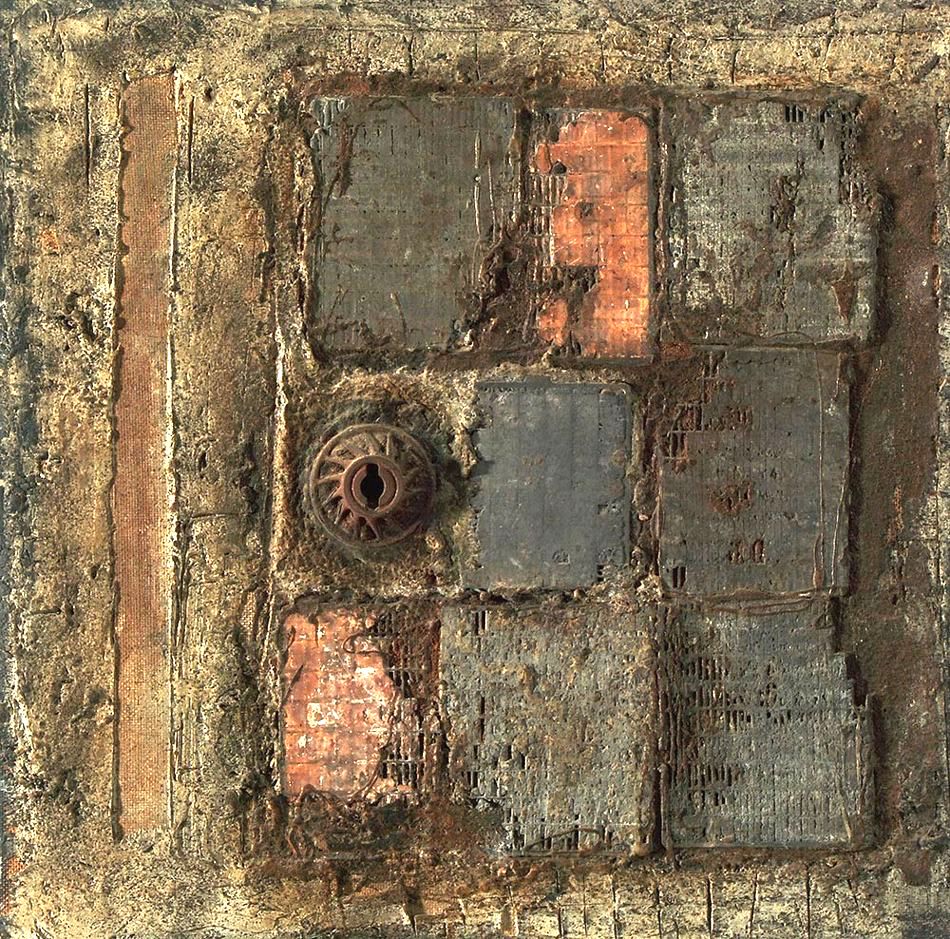
Elsa Gramcko, Venezuela, “El ojo de la cerradura” or “The Keyhole,” 1964.
Sovereign regionalism is not alien to the Caribbean, which has made four attempts to build a platform: the West Indian Federation (1958-1962), Caribbean Free Trade Association (1965-1973), Caribbean Community (1973-1989), and CARICOM (1989 to the present). What began as an anti-imperialist union has now devolved into a trade association that attempts to better integrate the region into world trade. The politics of the Caribbean are increasingly being drawn into orbit of the U.S. In 2010, the U.S. created the Caribbean Basic Security Initiative, whose agenda is shaped by Washington.
In 2011, our old friend Shridath Ramphal, Guyana’s foreign minister from 1972 to 1975, repeated the words of the great Grenadian radical T. A. Marryshow: “The West Indies must be West Indian’. In his article “Is the West Indies West Indian?,” he insisted that the conscious spelling of ‘The West Indies” with a capitalized “T” in “The” aims to signify the unity of the region. Without unity, the old imperialist pressures will prevail as they often do.
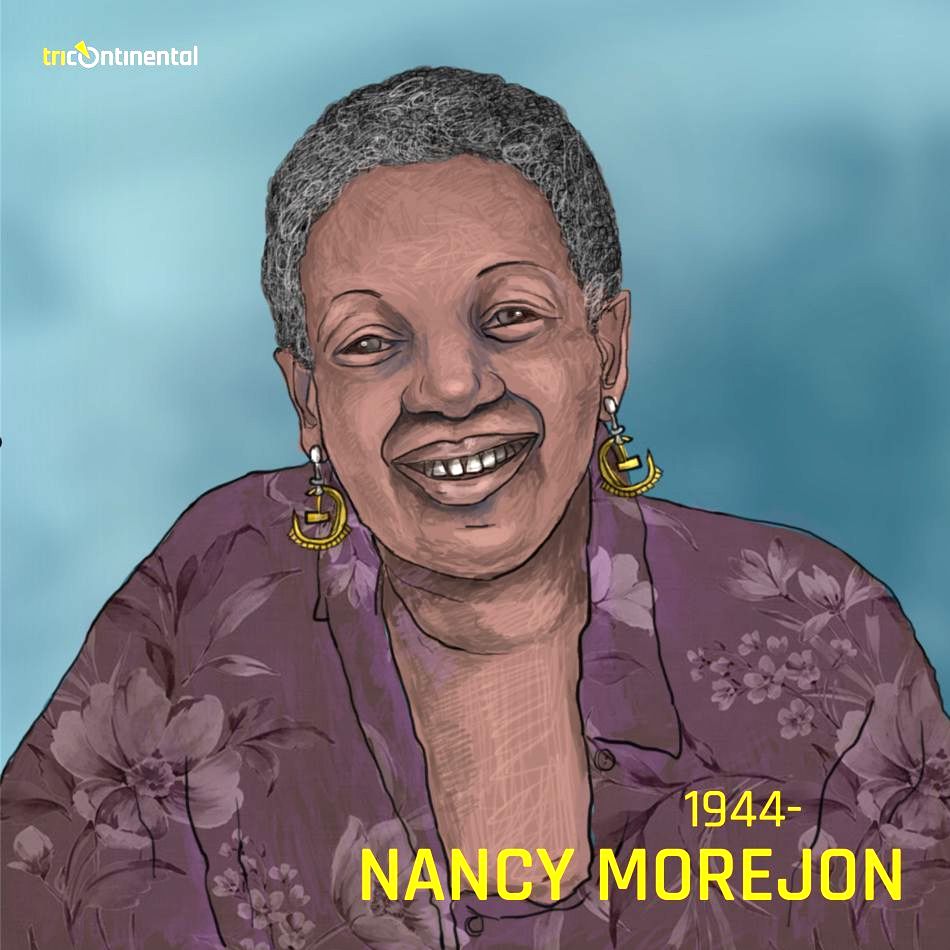
In 1975, the Cuban poet Nancy Morejón published a landmark poem called “Mujer Negra” or “Black Woman.” The poem opens with the terrible trade of human beings by the European colonialists, touches on the war of independence and then settles on the remarkable Cuban Revolution of 1959:
I came down from the Sierra
to put an end to capital and usurer,
to generals and to the bourgeoisie.
Now I exist: only today do we own, do we create.
Nothing is alien to us.
The land is ours.
Ours are the sea and sky,
the magic and vision.
My fellow people, here I see you dance
around the tree we are planting for communism.
Its prodigal wood already resounds.
The land is ours. Sovereignty is ours too. Our destiny is not to live as the subordinate beings of others. That is the message of Morejón and of the Cuban people who are building their sovereign lives, and it is the message of the Haitian people who want to advance their great Revolution of 1804.
Vijay Prashad, an Indian historian, journalist and commentator, is the executive director of Tricontinental: Institute for Social Research and the chief editor of Left Word Books.
This article is from Tricontinental: Institute for Social Research.
The views expressed are solely those of the author and may or may not reflect those of Consortium News.
Please Support Our
Summer Fund Drive!


Vijay Prashad barely mentions the fact that the Cuban Revolution has suffered military & political attacks as well as the economic sanctions of the blockade, el bloqueo. This goes well beyond the failed Bay of Pigs invasion and includes strafing of hotels, sabotage of production, and so on. Lately, the US has limited its attacks to the social sphere as revealed in the public accounts of NED et al agency spending. It is undoubtable that elements from Miami were on the ground instigating these public protests, feeding on disaffection caused by economic difficulties. It is an old, old story of regime change.
I like to remind people who claim that Cuba has become ‘authoritarian’ that Cuba is essentially at war and has been for its entire Revolutionary life.
“More mysterious forces are at work: US-based Haitian religious leaders, narco-traffickers, and Colombian mercenaries”
It would have made for a far better n effective article if comments like the one above were followed by verifiable names and facts. There’s a lot of interesting information in the article but it’s rather haphazardly connected.
Exactly what is Loco Joe on about with respect to the Latin Americas? He opens our country’s southern border to unimpeded extralegal immigration in vast numbers which will clearly swamp out the Anglo population in the entire Southwest of the country and cause serious social unrest for a long time to come. There are not jobs for these people any more than there are for Americans of other ethnic origins, so that is a bogus explanation. This is encouraged by him and his party by the fomenting of coups throughout the Latin countries from Central America to Tierra Del Fuego which stimulates the mass migrations. Then, at the same time, he applies the age-old policy of gangster El Norte by co-opting every national government possible, usually through violent means, under the diktat of the regime in Washington. So, the entire Western Hemisphere is to be ruled by whom and for the benefit of whom? Clearly not the people who founded the extant societies within the United States and throughout the rest of both Americas. Canada is plagued too by mass immigration from venues other than the Americas that seems not to benefit the builders of that society either. Are they at odds with or in cahoots with the social designers re-arranging life as we have known it in the US?
I fail to see the big picture whether the architects of this revolution are extremists from the left or the right. Meanwhile, nothing constructive is being done to mitigate the massive problems incipient in the areas of energy, natural resources, ecosystems, climate, housing, medical care and education, to name only the most obvious, in a world population wildly outgrowing all those things needed to sustain life or to, at least, slow their degradation. The flashy PR campaigns, like the conversion of all ICE’s to EV’s and the replacement of all fossil fuel energy sources to all solar and wind power are bait and switch con jobs. The essential resources (e.g., the Lithium and the Rare Earth Elements to manufacture the necessary batteries and electrical power plants) are simply not there–not for a population upwards of 10 or 12 billion, not for even the existing 8 billion. Meanwhile steps are never taken to harden the grid against the inevitable EMP that will come, if not from the handiwork of man, then from the Sun itself. Then the survivors will literally be living back in the dark ages.
But none of that gets a look in the headlong rush to what? Future projections by the most objective and rational analysts suggest that collapse of the West MUST occur well before the end of this century. It is in the beginning process NOW and will go to completion during the fourth quarter of this century. With this collapse the population will be decimated, leaving 10% of what exists today. This was projected as far back as 1970.
It seems that your diatribe is flawed by your insistence that ‘immigrants’ threaten the well-being of good old Anglo-Saxon white people. Look at the problem another way: these white people are invaders who have done a terrifying job of caring for and managing the land they conquered. They do not deserve it. The immigrants you worry about are mostly Indians or part-Indians. Think of them as coming to take their land back from the despoilers. Our only hope is that they will do a lot better job of environmental management.
Okay then, we’ll put you down as in favor of the “Reconquista” and that you can’t imagine why there should be any opposition to this from the extant Anglo population who just might be more motivated by economic and political fall out rather than their alleged raging racism.
No question that “the White Man” has made many mistakes with respect to preservation of the environment but at least his actions have been nominally guided by knowledge gained from scientific study of the world around him. More of this book learnin’ certainly needs to be abided by and put into practice than we have seen. However, attributing superior wisdom to the native peoples as you do is a bit misguided.
I have know university scholars who have gone down to Latin American countries where the indigenous peoples (tribes in the rain forests) still prevail as the majority and the scholars apprise me that the natives not only live under conditions of terrible poverty but they do much less to conserve nature than do the Euro “invaders.” They recklessly pollute and despoil their environment using Western products and chemicals which they eagerly acquire however they can. You may say their actions are obviously tainted by generations of watching and envying the “White Man.” Most probably, but don’t expect the reported 11 million extra-legal immigrants now in this country to set right the human interface with Nature in North America even if that were in their vaguest dreams. The “ownership class” with money and property rights will be the only ones who realistically will have those prerogatives. The imported peons will have no more than the privilege of vying with the already resident peons of competing for economic scraps at the table, only now with fewer scraps to go around.
Huge point missed: the way for the US (and hegemony) to become irrelevant is not to politically oppose it (been done; useless) but for the countries in question (Cuba, Haiti) to become prosperous… by moving to a Regulated (most mostly free) market economy managed (owned) by people with skin in the game… not bureaucrats who have nothing to lose (really) when they get everything wrong.
People who do no see this need to be checked for their management credentials: do they actually know what it means to manage anything? Create, resource, execute, and maintain projects? Or hire, motivate, and lead people? Or structure balanced deals with regulators/providers/partners? If they had a clue about this, they would know everything they need to know about why a Regulated (mostly free) market economy managed (owned) by people with skin in the game has no equal.
The US will continue to set terms with / dominate any country that idly wishes for an easier way to prosperity…. or those blaming history or whatever they want to blame. Whatever moral puffery a person wants to employ to justify their complaints, the reality is that authoritarian government (leftist or not) in whatever clothing (socialist, communist, fake demoncracy or other) kill incentives for people to self-organize and prosper. At the other extreme, the lack of principled government means that corruption flourishes and initiative dies on the vine. So such complaining contributes to the big distraction: yes, the US gov is often a pain in the a** (even for people in the US), but Cuba’s and Haiti’s and other country’s wealth and independence problems will be solved there… though change and adoption of ‘better practices’… and not by pretending that crying victimhood actually accomplishes anything.
Your contention that the ‘free market’ and technocrat managers with skin in the game will do a superior job of developing a country is deeply flawed. We see the results of this neoliberal program all around us with its environmental degradation, social and economic inequality, and the climate catastrophe. No thanks!
The Devil in the West never sleeps.
Americans should demand to stop paying taxes
to the MIC which has extended old world colonization blood baths.
Until then the zombie hoards consume.
Evidently, the Latin phrase “Mare Nostrum” was only horrendous when used by Benito Mussolini. When implied by the Biden administration and its chain of predecessors, it is apparently just fine. Introspection and reflection on point by those of us who consider ourselves progressives and antiwar activists is critical but not enough, we need to start voting our consciences instead of against strawmen and straw-women and straw-issues artfully drawn by Deep State tools. Rather than the pejorative concept being posited by traditionalist politicians and the corporate media, “populism” is democracy rejecting the institutions and structures imposed on it render it a mere mirage. Populism is neither exclusively leftwing nor exclusively rightwing, it is a reaction against the deep state dictatorships by a large segment of the population with a rainbow of differing policy perspectives but with a common interest in eschewing violence and coercion as a means of dispute resolution. Traditionalist politicians and parties (such as the Democratic Party in the United States) are Deep State tools whose mission is to keep us polarized and divided while spouting noble sounding phrases never meant for implementation.
Only when populists realize that, despite policy differences, they need to unite to end cronyism and corruption, impunity, inequality, inequity and injustice, can we start the work of creating a world fit as a bequest for our progeny.
Excellent proposal. However, the term ‘populism’ in the U.S. historically has been progressive socially and economically and is attributed to the Trump phenomenon only because of a vague confusion with ‘popularity’. The great populists of the past proposed policies that the mainstream Democrats (such as FDR), although slowly, adopted in time.
Vijay Prashad is prescient to note the assertive power projection of US hegemony and sea power symbolised by the multi spectrum (air sea land and cyber space) show of force conveniently mustered on the colonial seas of the Caribbean prior to the events in Havana and Porte-au- Prince. In undisguised business speak US southern command describes Exercise Tradewinds 2021 in terms of the its corporate mission to ”strengthen partnerships counter threats and build teams”. What nonsense to describe the actions of the biggest bully on the block a short account before delivering two covert punches in Havana and Porte prince as a warning to any upstart contenders. The support of former colonial powers in this imperial masquerade is illustrative of the history of genocide and exploitation suffered by the indigenous and slave populations of the islands recounted by Vijay.
This gunboat diplomacy (courtesy of the British Empire)is becoming more rampant in the context of multilateral challenges to the Western Imperium witness the freakish behaviour of UK HMS Defender sailing into Crimea with all cannons loaded and crew on decks at action stations. Expect more of these exercises in confrontation as the challenges pile up and the US/UK depraved elites abandon diplomacy for the law of the jungle.
usa out of Cuba
…out of The Indies
Excellent short history of usa violence in the region.
usa violence générâtes & compels humanitarian interference from Russia & China.